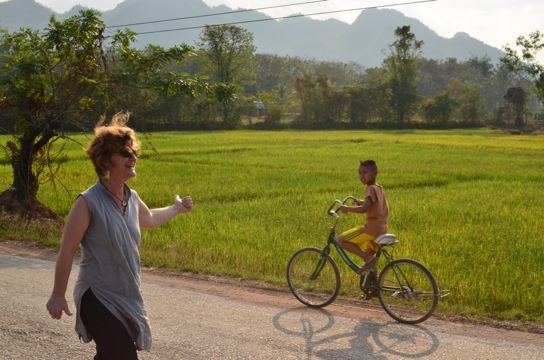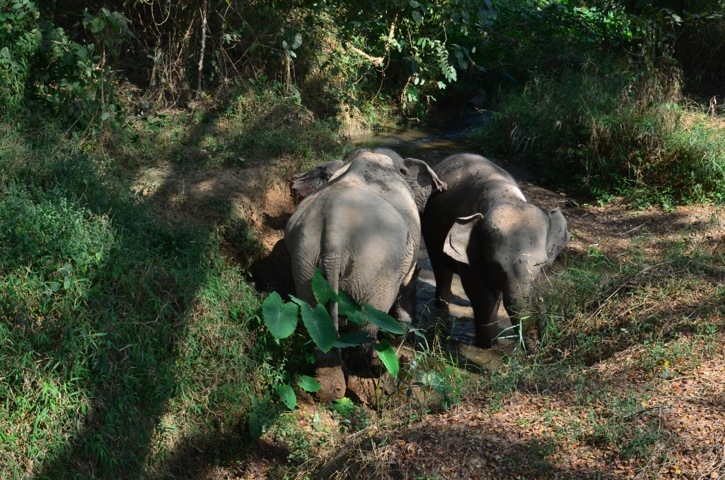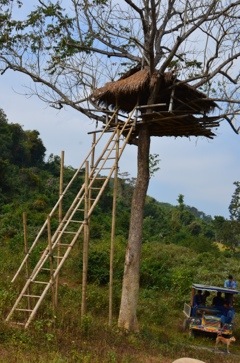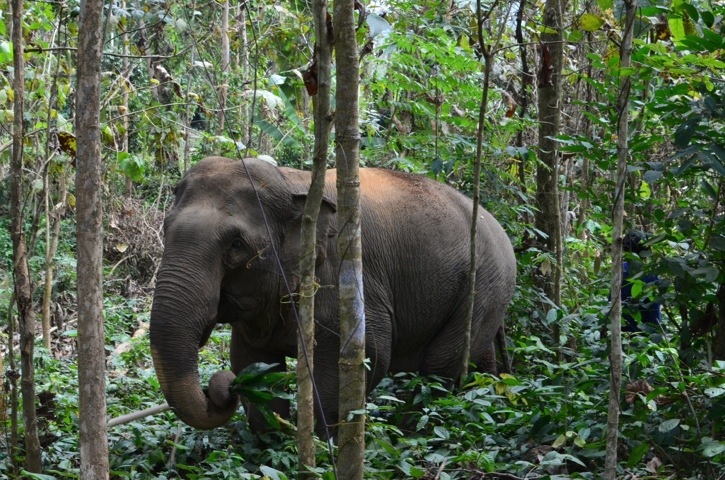I’m not sure what makes the mountains of Thailand. The way they press suddenly up out of the plains, covered in jungle, mounded, broken but unassailably beautiful.
The rice paddies are a kind of green to make Ireland sit up and take notice. The trees that dot their edges are tall and lush. Our driver pulled a young rice plant out of the wet and offered us the soft, immature kernels out of the green. Snow-white and starchy-sweet, they were nothing like the hard wands of bad fried rice.
Katherine, beautiful 30-year-old pale-faced Australian matriarch of BLeS, doesn’t give out her cel phone number. You have to engage the pilgrimage out, out, out, beyond Sukothai, beyond the rice paddies and the villages that scatter across the plains, along the roads a colorful jumble like dropped child’s toys. But then, but then you arrive. A narrow road back between timber bamboo. Grey shapes moving at the edge of a green pond, the slow churning of great grey flesh. A trumpet and an answering chirp. One elephant has been on walkabout – an hour, maybe more – but so delighted to see her adopted family (her 2 new ‘sisters’) again, that even on her broken leg (irreperable), she scampers in a most unelephantine fashion uphill, blowing and trumpeting. It gives me hope about being more gainly myself.
We rest in a hut while the elephants gather, we hear their stories – some sad, mostly lovely. Some injured, some whole. They are going, going, up the road, to the section of small jungle that BLeS owns for them to wander in – well, and outside, of course, because elephants respect humans, but not that much.
We walk after them. Even at an amble, they quickly vanish into the distance. The sun is fierce, and the air is the tightening grasp of an unwelcome, sweaty god.
There is a treehouse. The elephants have ungrouped, wandering in the banana trees and clumping and playing in the bamboo. We follow some down to the river. We feast on sticky rice and vegetables. They feast on (whole) banana trees and thickets of bamboo.
They descent – slowly, slowly, slowly – down the muddy bank, into the knee-high water. They chirp, push each other in, lie down, mix up cool mud, splatter themselves, make the mahouts nervous by edging up the bank to where we are all gawping.
Dear god, don’t poop in the stream! They check each other in the most indelicate ways. The mahouts are a quiet presence. These men have given up their hooks and instead rely on their relationships with the great beasts, rely on the power of bananas and friendship.
We get to bathe them, and feed by hand one of the elephants who will never be released (as a young elephant she was chained on concrete and got an incurable fungal foot infection that will eventually kill her, but she is sweet and princessy and opens her mouth, patiently waiting to be fed whole chunks of watermelon and pineapple).
At night, the mahouts without the elephants are jovial. They are amused by a big hairy white man, and ply me with rice moonshine. We compare arm color and belly fur. They laugh uproariously. I become a living jungle gym for Katherine and Anon’s children. Anon is a muscular, quiet, friendly mahout, not speaking English. He is a kind of background leader. I want to learn that.
The elephants trundle off to be put up for the night. We trundle off to be put up for the night. Anon meets us with intense handshakes, sincere wais as we go. Lec, our guide, pulls me by the hand, “Gogo,” he says, pushing me into the truck, “otherwise, you will be very drunk!”



